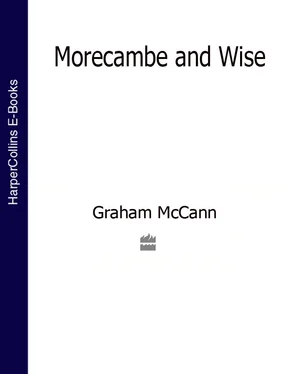Morecambe
&
Wise
Graham McCann

Fourth Estate
A division of HarperCollins Publishers
1 London Bridge Street
London SE1 9GF
www.haprercollins.co.uk
First published in Great Britain in 1998 by Fourth Estate Limited
This edition published in 1999
Copyright © Graham McCann 1998
The right of Graham McCann to be identified as the author of this work has been asserted by him in accordance with the Copyright, Designs and Patents Act 1988.
A catalogue record for this book is available from the British Library.
All rights reserved under International and Pan-American Copyright Conventions. By payment of the required fees, you have been granted the nonexclusive, nontransferable right to access and read the text of this e-book on-screen. No part of this text may be reproduced, transmitted, downloaded, decompiled, reverse-engineered, or stored in or introduced into any information storage and retrieval system, in any form or by any means, whether electronic or mechanical, now known or hereafter invented, without the express written permission of HarperCollins e-books.
HarperCollins Publishers has made every reasonable effort to ensure that any picture content and written content in this ebook has been included or removed in accordance with the contractual and technological constraints in operation at the time of publication.
Source ISBN: 9781857029116
Ebook Edition © FEBRUARY 2015 ISBN: 9780008187552
Version: 2016-05-05
To John Ammonds
Great comedy, great wit, makes the ceiling fly off, and suddenly liberates us again as we were when we were much younger and saw no reason not to believe that we could fly, or become someone else, or bound on a trampoline and not come down.
PENELOPE GILLIAT
Cover
Title Page
Copyright
Dedication
PROLOGUE
PART ONE: MUSIC-HALL
I Northern Songs and Dances
II Morecambe before Wise
III Wise before Morecambe
IV Double Act, Single Vision
PART TWO: TELEVISION
V A Box in the Corner
VI Running Wild
VII A Brand New Bright Tomorrow?
VIII Two of a Kind
PART THREE: MOVIES
IX American Visions
X The Intelligence Men
XI That Riviera Touch
XII The Magnificent Two
PART FOUR: A NATIONAL INSTITUTION
XIII The Show of the Week
XIV Mass Entertainment
XV Get Out of That
XVI Loose Ends
EPILOGUE
Keep Reading
Acknowledgements
List of Performances: Radio, Television, Movies and Records
Notes
Bibliography
Index
About the Author
About the Publisher
| ERIC |
Let’s face it: he’s half a star, isn’t he? |
| ERNIE |
Yes: I’m half a star. |
Television has shaped us – you can blame it for ‘abbreviated attention span’ and a failure to believe in realities; or you can notice how it promotes a low-level passive surrealism in expectations, and an uncatalogued memory bank for our minds. We may be more like crazed movie editors trying to splice our lives together because of TV. There is a resistance it has bred, as well as a chaos: you can’t have one without the other. And in the end, there is no point in being gloomy or cheerful about it. It’s there, here, without moratorium or chance of reversal.
DAVID THOMSON
Among those whom I like or admire, I can find no common denominator, but among those whom I love, I can: all of them make me laugh.
W. H. AUDEN
It happened one night. It happened, to be precise, at 8.55 p.m. on the night of 25 December 1977, when an estimated 28,835,000 people 1– more than half of the total population of the United Kingdom – tuned their television sets to BBC1 and spent the next hour and ten minutes in the company of a rather tall man called Eric and a rather short man called Ernie.
It was an extraordinary night for British television in general and for the BBC in particular: 28,835,000 viewers for a single show. It was – at least as far as that catholic and capacious category known, somewhat apologetically, as ‘light entertainment’ was concerned – as close as British television had ever come, in some forty-one years of trying, 2to being a genuine mass medium. None of the usual rigid divisions and omissions were apparent in the broad audience of that remarkable night: no stark class bias, no pronounced gender imbalance, no obvious age asymmetry, no generalised demographic obliquities. 3The show had found its way into dense council estates, lofty tower blocks, smart suburban squares and leafily discreet country retreats – it was even watched with uncommon avidity at Windsor Castle, where assembled members of the Royal Family delayed their Christmas dinner until they had seen the show through to its proper conclusion. 4
It was also, of course, an extraordinary night for the two stars of that show: Eric Morecambe and Ernie Wise – by far the most illustrious, and the best-loved, double-act that Britain has ever produced. Exceptionally professional yet endearingly personable, they were wonderful together as partners, as friends, as almost a distinct entity: not ‘Morecambe and Wise’ but ‘Morecambewise’ – one never could see the join. There was Eric and there was Ernie: one of them an idiot, the other a bigger idiot, each of them half a star, together a whole star, forever hopeful of that ‘brand new, bright tomorrow’ that they sang about at the end of each show. True, Eric would often slap Ernie smartly on the cheeks, but that was just a welling-up of applause that had been brought to a head: they clearly thought the world of each other, and the world thought a great deal of them, too.
Their show succeeded in attracting such a massive following on that memorable night because it had, over the course of the previous nine years or so, established, and then enhanced, an enviable reputation for consistency, inventiveness, unparalleled professional polish and, last but by no means least, a strong and sincere respect for its audience. The Morecambe & Wise Show stood for something greater, something far more precious, than mere first-rate but evanescent entertainment; it had come to stand – just as persuasively and as proudly as any earnest documentary or any epic drama – for excellence in broadcasting, the result not just of two gifted performers (great talent, alas, does not of itself guarantee great television) but also of a richly proficient and supremely committed production team. Together they combined to realise the basic ideal of public service broadcasting: that admirable old Reithian ambition to make excellence accessible, ‘to carry into the greatest possible number of homes everything that is best in every department of human knowledge, endeavour, and achievement’. 5
The show, culminating in the record-breaking triumph of that 1977 special, represented an achievement in high-quality popular programme-making that is now fast assuming the aura of a fairy tale – destined, one fears, to be passed on with bemused fascination from one doubtful generation to its even more disbelieving successor as the seemingly endless proliferation of new channels and novel forms of distraction continue to divide and disperse the old mass audience in the name of that remorseless (and self-fulfilling) quest for ‘quality demographics’ and ‘niche audiences’. The Morecambe & Wise Show appeared at a time before home video, before satellite dishes and cable technology, before the dawning of the digital revolution, a time when it was still considered desirable, as well as practicable, to make a television programme that might – just might – excite most of the people most of the time. Not every programme-maker and performer from this time was particularly well equipped or strongly inclined to pursue such a possibility, but Morecambe and Wise, working in close collaboration with the BBC, most certainly were.
Читать дальше












![Brian Thompson - A Monkey Among Crocodiles - The Life, Loves and Lawsuits of Mrs Georgina Weldon – a disastrous Victorian [Text only]](/books/704922/brian-thompson-a-monkey-among-crocodiles-the-life-thumb.webp)
